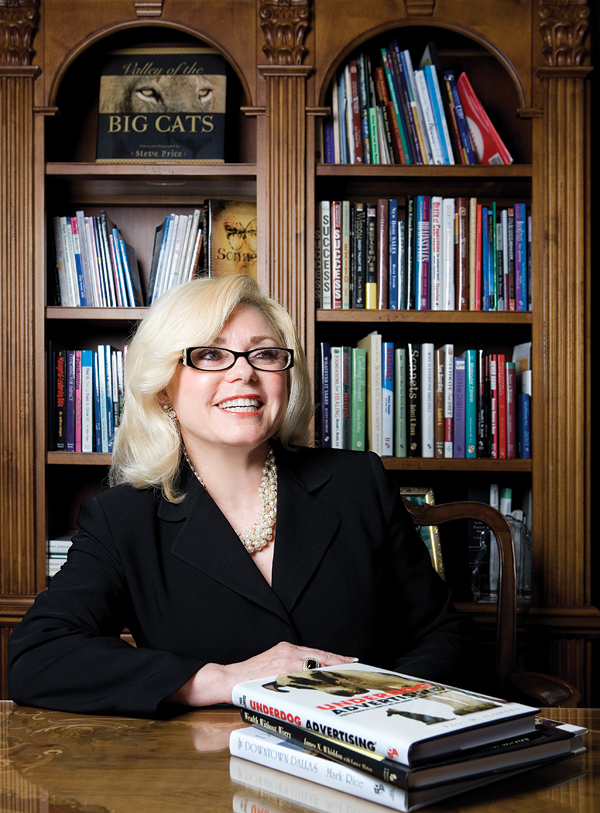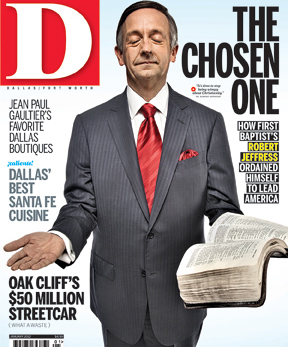Brown, who declines to disclose revenue for her company, says it will publish about 150 books this year, a slight increase from the previous 12 months.
David Leach, who spent nearly 11 years at a religious publisher before joining Brown Books, says he jumped ship because, “I loved her business model.”
As an example of how Brown is different, Leach pointed to the “buyback” programs of traditional publishers, which caused him to grow
increasingly disenchanted. A “buyback” refers to the practice of selling copies of an author’s book back to him or her, usually at 60 percent off the retail price. Businessmen, professional speakers, and religious ministries then sell these books at speaking engagements or give them away to friends, family, and customers.
“One question we always had to ask was, ‘How many copies do you plan to buy?’” Leach recalls. “The big ministries might take 10,000, so in effect they were financing their own endeavor.”
Regarding her business model, Brown says, “The business world is wired to think differently. Businessmen and professional speakers got it first. I went to a romance writers’ conference one time. They didn’t get me, and I didn’t get them. A businessperson cares about retaining rights and turning a profit. Authors–quote, unquote—just want validation.”
Straddling the Fence
While Brown may not be the typical publisher, she is in some ways the typical entrepreneur. She made her first million dollars in Atlanta, in multi-level marketing for Nutrisystem, just past the age of 30. She moved to Dallas in 1990 to get married (she describes herself now as “happily divorced”) and then stumbled into publishing through serendipity and a head for business.
“In my 20s I was very much a Type-A personality, driven by money,” Brown says. “But after I moved to Dallas I started losing a lot of special people in my life, and I realized that there were questions that I meant to ask that now would go forever unanswered. Their stories would be forgotten, and I thought, ‘These need to be written down.’ ”
She responded by creating something called Personal Profiles in 1991. The business involved creating family histories in beautiful, leather-bound books. In less than a year, her short stint as a stay-at-home mom was over.

“I had no business plan,” she recalls, “but ignorance is bliss. We were fortunate in getting some good publicity, and it took off like a rocket. Then a year or two into it, I started getting calls referred to me by clients. ‘Grandaddy said you could help with my children’s book.’ I kept turning them down until one day I had a little baby epiphany. I have editors, designers, printers, etc. I know how to do books. I decided I would do a book or two a year, but two became four, which became eight, and the referrals just kept pouring in.”
By 1994, Brown launched Brown Books Publishing Group as a separate entity. (Personal Profiles has subsequently been folded into the larger operation as a division.) She trademarked the slogan, “A New Era in Publishing,” but it’s doubtful she realized how prophetic those words would be. The publishing environment of 2012 is completely different than that of 18 years ago, thanks to the Internet and the ever-evolving digital market for content.
While the rest of the publishing world has been rocked to its core and forced to reevaluate its business practices, Brown’s decision to straddle the fence between vanity press and traditional publisher looks like a stroke of genius—or beginner’s luck.
Regardless, Brown has continued to steer her own course.
“What’s unusual about Milli is that she’s totally her own” person, Leach says. “She can write her own rules. They tend to make sense, and if not, it doesn’t matter. She doesn’t have to worry about investors. There’s a larger than life air about the whole place. She’s opinionated, unapologetically so, yet she’s fair—really fair in terms of how she deals with authors.”
Some former employees of the company, however, view Brown’s fairness quotient less charitably. While conceding that she is intelligent, they also contend that she can be manipulative and vindictive, and describe a workplace akin to that portrayed in The Devil Wears Prada, said to be about Vogue magazine’s imperious editor, Anna Wintour. Because of this, one ex-employee says, turnover at the book-publishing company has been “enormous” at times.
Brown, disagreeing strongly, says this characterization is completely off the mark. She’s only fired one person in the last year, she says, while another left to “go back into the ministry again.”
A little later she adds, “The weak will not survive at Brown Books. I don’t have any slackers. … I’m not going to say I’m easy to work for. I’m tough, because I demand excellence, and only the best will end up with me long-term. I’m not going to apologize for that, because my authors benefit.”
From the beginning, Brown has grown her business incrementally, even during tough times. (“I refuse to participate in this recession,” she says.) Last year she launched a new Christian books division, Brown Christian Press, as well as two other new ventures for which she holds high hopes.
The first was a partnership with Zig Ziglar, the nationally known motivational speaker. The relationship kicked off with Ziglar’s new book, Born to Win, in September. “His organization is long overdue for branding,” Brown says, barely containing her excitement. “We … launch with six books for their top speakers. They will acquire the talent and we will publish the book.”
In addition, she hired the previously mentioned Michael Levin to create a Business Books division, which hopes to debut its first book in February, followed by three to five titles per month afterward. Brown made this move in order to focus more on the core of her business—books by chief executive officers.
“I love my CEOs,” she says. “We probably publish more CEO authors than any other demographic. They get right to the point. They are decisive. They don’t want to drag out a project and never let go of it. In the publishing business, time equals money.”
With the business-publishing unit in place, Brown plans to devote more attention and resources to her corporate authors so that books can come together more efficiently.
Levin, who will remain based in Orange County, Calif., says he plans to extend the reach of Brown’s marketing efforts by making the rounds to tell the story of Brown Books to as many meetings, groups, and conventions as he can book. His mantra? “Every leader needs a book, like every employee needs a business card.”
Brown agrees. “Our culture is accustomed to thinking that if you’re an expert, you must have written a book. It’s my responsibility to make sure the book is an enhancement of the image.”
Paul Spiegelman, chief executive at Beryl, a Bedford-based healthcare outsourcing firm, chose Brown Books as his publisher for just that reason. His book, Why Is Everyone Smiling?: The Secret Behind Passion, Productivity, and Profit, was published in 2007. Three years later he was named an Ernst & Young Entrepreneur of the Year in the “Spirit of Entrepreneurship” category.
“I wanted to do a book for three reasons,” he says. “First, to give our culture a legacy document that could live on. Second, I felt it could be a significant marketing tool for our business. And third, I have a personal passion for employee engagement as a platform for business success.”
Spiegelman also believed Brown Books was a better fit for his vision for the book than a traditional publisher would have been. “I was not out to do a bestseller,” he explains. “I wanted to deliver a message, and having ownership of the content and distribution of the content was primary for me. Control, in a more digital world, is critical. Brown was ahead of the game on that score. I’m very interested in the digital media side, and she’s well-positioned to take advantage of that.”
Publicity for GCB
In late November, Kim Gatlin was eagerly awaiting the March 4 debut of the TV show based on her Brown Books novel, Good Christian Bitches.
Ten episodes of ABC’s GCB show have already been filmed, she said, and the new program, scheduled to follow Desperate Housewives on Sunday nights, will be promoted heavily during the Feb. 26 Academy Awards telecast.
Coinciding with the TV show, Hyperion Publishing will also re-publish Good Christian Bitches in a paperback version, Gatlin said. Target, considered a book-buying bellwether, already had placed an order for 6,500 copies of the new release.
And Gatlin’s follow-up novel, titled Good Christian Bastards, was being considered by Mel Berger of WME (William Morris Endeavor), a diversified talent agency in New York.
Back in Dallas, meanwhile, the company that started the ball rolling for Gatlin has grown steadily over the last 18 years. But Milli Brown insists that Brown Books is “still in the infancy stage of being the best-kept secret in publishing.”
As a result, Brown is an unlikely candidate for retirement anytime soon.
“Retire?” she says. “No way. I have so much to accomplish, so much to do. I never know who’s going to walk in the door next!”
Chances are good, though, that it won’t be Kim Gatlin.
A condensed version of this story appears in the print version of D Magazine.





